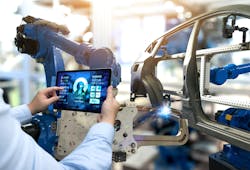Process automation, workforce development and expansion are key to automotive evolution
On June 6, Rockwell Automation's 8th Annual State of Smart Manufacturing Report: Automotive Edition was published, which surveyed 200 managers and executives from automotive manufacturers, automotive supply manufacturers and electric-vehicle manufacturers across 13 nations. The report provides valuable insights into the key challenges and considerations faced by manufacturers and outlined opportunities for new technology within the industry.
It's safe to say that during the past few years few sectors have had to evolve as much as the automotive industry. With such a diversity of raw materials and components across a complex ecosystem of suppliers and partners, the ongoing impact of the COVID-19 pandemic, supply chain disruptions, microchip shortages and labor challenges have made this evolution anything but straightforward!
While the number one internal challenge, identified by 40% of automotive manufacturers, was the need to balance quality with profitable growth, new employee onboarding (39%) and worker retention (38%), were among the top five concerns highlighted by respondents around growth in 2023. Externally, the supply of automotive manufacturing raw materials continues to be affected by the fallout of the pandemic. Concerns about materials shortages this year were voiced by 54% of our respondents, up from 45% in 2022.
Yet, despite these challenges, a focus on the pursuit of quality has been maintained by manufacturers. Aligned with this focus is a commitment to process automation and the adoption of smart manufacturing. What is clear from the report is that technology plays an increasingly essential role in mitigating risks, navigating workforce challenges, minimizing costs, improving quality and boosting production. These factors are all driving the acceleration of digital transformation across the automotive industry.
The automotive industry has long been one of the most innovative when it comes to bringing new technologies to consumers and also investing in technology. That trend continues at pace, with technology being invested in by automotive manufacturers, on average, with 23% of their operating budget. This includes cloud technologies (32%) and cybersecurity (30%), with automation on the plant floor being invested in by 41% of manufacturers.
Almost two thirds of businesses reported that they use software to automate processes, and 54% are increasing automation to address labor shortages. Automotive manufacturers ranked process automation as the highest ROI investment. Furthermore, 31% of automotive manufacturers have either already invested in AI and machine-learning technologies or intend to do so, with the expectation that this will only increase as more use cases develop along with user-friendly applications.
Despite the increased use of technology, the workforce remains critical to growth. Our report supports Sir Richard Branson's famous quote, "A company's employees are its greatest asset." An overwhelming majority of automotive manufacturers (85%) expect to maintain or even increase their current workforce. Of these, 42% plan to repurpose their existing workforce and 27% intend to hire more workers because of technology adoption. For example, with the transition to electric vehicles and manufacturers training, or retraining, their workforce, technology has a vital role in this transformation, not only at existing facilities but also at newly established greenfield plants.
However, automotive leaders still face a complex set of economic challenges externally and critical change-management internally, with almost half, 47%, citing inflation as an ongoing and key issue. Internally, effective change management plays a vital role in overcoming barriers to the rapid adoption of new technologies. Nearly half of businesses (48%) reported a lack of skills to manage smart manufacturing initiatives and a similar number (46%) encountered employee resistance to new technologies as the biggest obstacles. Moreover, selecting the right solution remains a challenge for automotive manufacturers, with 26% of respondents mentioning "technology paralysis" as one of their main obstacles.
Looking ahead, 44% of automotive manufacturers stated they rely on automation to help transform their business over the next five years, and 41% are also relying on improving their use of data analytics. As 35% of data in the auto industry goes unused, there is a need and opportunity for manufacturers to deploy advanced data-gathering and analysis tools to derive maximum value from data. By addressing these data challenges, automotive manufacturers can enhance the tangible return on investment of existing smart manufacturing initiatives and drive the industry's digital transformation journey to achieve increased profitable growth in 2023 and beyond.
About the Author
Paul Epperson
Vice president, global industry–auto, tire & advanced mobility, Rockwell Automation
